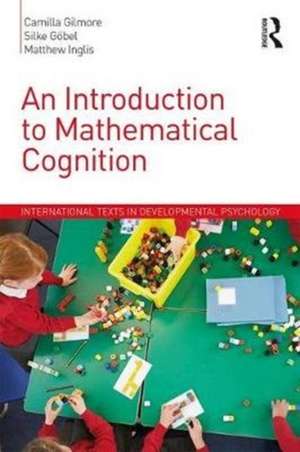An Introduction to Mathematical Cognition: International Texts in Developmental Psychology
Autor Camilla Gilmore, Silke M. Göbel, Matthew Inglisen Limba Engleză Paperback – 5 iun 2018
| Toate formatele și edițiile | Preț | Express |
|---|---|---|
| Paperback (1) | 289.21 lei 3-5 săpt. | +24.08 lei 4-10 zile |
| Taylor & Francis – 5 iun 2018 | 289.21 lei 3-5 săpt. | +24.08 lei 4-10 zile |
| Hardback (1) | 1000.27 lei 6-8 săpt. | |
| Taylor & Francis – 5 iun 2018 | 1000.27 lei 6-8 săpt. |
Din seria International Texts in Developmental Psychology
-
 Preț: 319.20 lei
Preț: 319.20 lei -
 Preț: 370.09 lei
Preț: 370.09 lei -
 Preț: 421.61 lei
Preț: 421.61 lei -
 Preț: 436.18 lei
Preț: 436.18 lei -
 Preț: 380.36 lei
Preț: 380.36 lei -
 Preț: 448.10 lei
Preț: 448.10 lei - 15%
 Preț: 444.36 lei
Preț: 444.36 lei -
 Preț: 452.62 lei
Preț: 452.62 lei -
 Preț: 382.99 lei
Preț: 382.99 lei -
 Preț: 310.18 lei
Preț: 310.18 lei -
 Preț: 350.39 lei
Preț: 350.39 lei
Preț: 289.21 lei
Nou
Puncte Express: 434
Preț estimativ în valută:
55.34€ • 57.78$ • 45.70£
55.34€ • 57.78$ • 45.70£
Carte disponibilă
Livrare economică 25 martie-08 aprilie
Livrare express 08-14 martie pentru 34.07 lei
Preluare comenzi: 021 569.72.76
Specificații
ISBN-13: 9781138923959
ISBN-10: 1138923958
Pagini: 264
Dimensiuni: 156 x 234 x 24 mm
Greutate: 0.49 kg
Ediția:1
Editura: Taylor & Francis
Colecția Routledge
Seria International Texts in Developmental Psychology
Locul publicării:Oxford, United Kingdom
ISBN-10: 1138923958
Pagini: 264
Dimensiuni: 156 x 234 x 24 mm
Greutate: 0.49 kg
Ediția:1
Editura: Taylor & Francis
Colecția Routledge
Seria International Texts in Developmental Psychology
Locul publicării:Oxford, United Kingdom
Cuprins
1. Introduction 2. Nonsymbolic number 3. Symbolic number 4. The development of arithmetic skills 5. Understanding arithmetic concepts 6. Individual differences and mathematical difficulties 7. Number systems 8. Algebra and equivalence 9. Mathematical argumentation and proof 10. Logic, conditional reasoning and mathematics 11. Where next for mathematical cognition?
Notă biografică
Camilla Gilmore is a Reader in Mathematical Cognition in the Mathematics Education Centre at Loughborough University. Her research explores the development of numerical skills in children and adults.
Silke Göbel is a Senior Lecturer in Psychology at the University of York. She teaches courses on Numerical Cognition, Dyscalculia, Mathematics Anxiety and Neuroscience of Numbers and Arithmetic. Her current research focuses on predictors of mathematical development.
Matthew Inglis is a Reader in Mathematical Cognition in the Mathematics Education Centre at Loughborough University. He is interested in understanding the processes involved in numerical and mathematical reasoning, and how these can be promoted through education.
Silke Göbel is a Senior Lecturer in Psychology at the University of York. She teaches courses on Numerical Cognition, Dyscalculia, Mathematics Anxiety and Neuroscience of Numbers and Arithmetic. Her current research focuses on predictors of mathematical development.
Matthew Inglis is a Reader in Mathematical Cognition in the Mathematics Education Centre at Loughborough University. He is interested in understanding the processes involved in numerical and mathematical reasoning, and how these can be promoted through education.
Recenzii
"Not only does this book provide up-to-date, accurate summaries of topics that have been well studied (basically aspects of mathematics acquired in the first decade of life among most children in Western and East Asian countries), it also examines less-studied topics that are likely to become increasingly important in the future, such as number systems, mathematical argumentation, and proof. Everyone interested in mathematical cognition will want to have this book." - Robert Siegler, Carnegie Mellon University, USA"The field of mathematical cognition has grown tremendously over the past few decades. This book, written by three leading experts, provides a comprehensive summary and analysis of these advances. It represents an invaluable resource not only for those interested in mathematical cognition but also for instructors teaching courses on this field and their undergraduate and graduate students." – Daniel Ansari, The University of Western Ontario, Canada
"An Introduction to Mathematical Cognition is a much-welcomed addition to this growing and important literature. The volume is written by three highly respected scientists and covers an impressive range of topics from our evolved number sense to students’ understanding of mathematical proofs. It will be of interest to experts in the field and students wanting to learn more about the field." – David C. Geary, University of Missouri, USA
"An impressively coherent, systematic and clear introduction into the cognitive systems that underlie mathematical learning and performance from early childhood to adulthood, relying on a rich diversity of behavioural and neuroscientific methods. A vital book for students and researchers in mathematical cognition and adjacent fields." - Lieven Verschaffel, Katholieke Universiteit Leuven, Belgium
"An Introduction to Mathematical Cognition is a much-welcomed addition to this growing and important literature. The volume is written by three highly respected scientists and covers an impressive range of topics from our evolved number sense to students’ understanding of mathematical proofs. It will be of interest to experts in the field and students wanting to learn more about the field." – David C. Geary, University of Missouri, USA
"An impressively coherent, systematic and clear introduction into the cognitive systems that underlie mathematical learning and performance from early childhood to adulthood, relying on a rich diversity of behavioural and neuroscientific methods. A vital book for students and researchers in mathematical cognition and adjacent fields." - Lieven Verschaffel, Katholieke Universiteit Leuven, Belgium
Descriere
The book traces the development of mathematical skills from basic number concepts to mathematical proofs, emphasising the hierarchical nature of mathematical development from early childhood to research-level mathematics.
